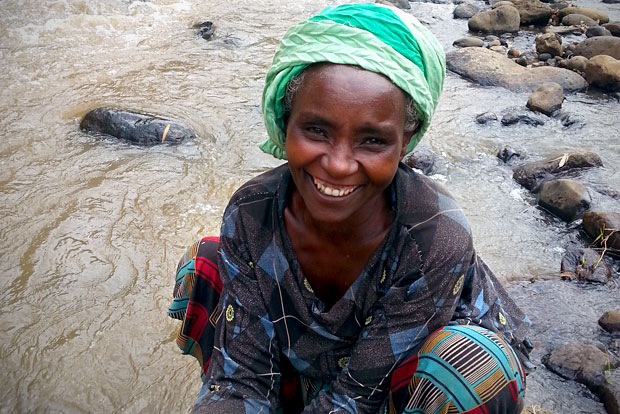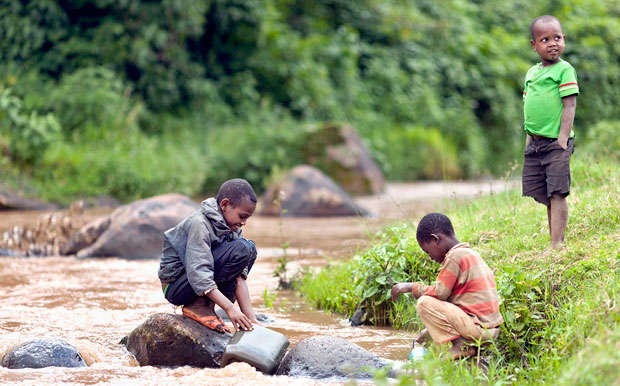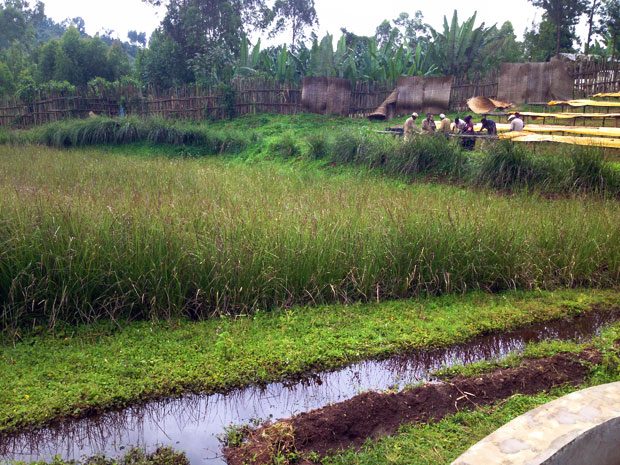Promoting Clean Water and Sustainable Coffee in Ethiopia
In honor of World Water Day, we share the story of an Ethiopian village that is benefiting from a natural solution to treating wastewater from coffee processing.

Coffee and water are both central to Elfe Gobe’s livelihood. The 38-year-old mother of five grows coffee and food crops on her one-acre farm in the village of Sheiche in Ethiopia’s Sidama zone. Her coffee income helps cover the costs of school fees, clothing for her children and other necessities of life.
In addition to farming, Elfe works at the wet mill of the Hondobana Borbodo coffee cooperative, where she assists in sorting, processing and drying coffee. The wet mill sits on the bank of the Kolla River, the main water source for more than 20,000 people in the area. At home, Elfe regularly fetches water for cooking and cleaning from the Kolla. Since early childhood, the river has been central to Elfe’s life.
“It has been everything to us,” she says. “Water sustains life for all human beings. The lives of women are especially tied to water.”
For years, the Hondobana Borbodo wet mill and others in the village would discharge the byproducts of coffee processing – wastewater and pulp, the skin of the coffee fruit – directly into the Kolla. When Elfe first started working at the wet mills, a foul smell pervaded the surrounding area, and the pollution made the Kolla’s water hazardous. She and others in her village had to adjust the times they fetched water in order to avoid peak discharge times and minimize the risk of contaminated cooking and cleaning water. Elfe often made long trips to smaller tributaries to find clean drinking water for her livestock, and she worried about the health of her children.

In partnership with Mother Parkers Tea & Coffee and its Brown Gold® brand, TechnoServe has worked with Hondobana Borbodo and other wet mill operators along the Kolla River to implement a low-cost, sustainable approach to water treatment – vetiver grass wetlands. The vetiver grass’s deep roots suck up the water, slowing down flow and infiltration into the soil. The remaining effluent, if any, is stored in a small pond at the bottom of the wetland to evaporate. Meanwhile, the coffee pulp is separated from the wastewater and treated with microorganisms to accelerate decomposition and reduce the smell before composting.
TechnoServe is working with 17 wet mills in Sidama. We have helped install more than 40 such wetlands at wet mills throughout East Africa, but the partnership with Mother Parkers represents the first effort to target all wet mills along a single river system and thereby impact an entire watershed. Better water treatment will not only improve water quality for families who depend on the river, it will promote a more sustainable and competitive coffee industry.

At Hondobana Borbodo, which installed a vetiver wetland in 2012, Elfe says the smell is gone, and the wet mill now turns coffee pulp into compost, which she uses on her farm. Thanks to Hondobana Borbodo’s efforts to improve water quality in the Kolla, Elfe and other people in her village can see the promise of a more sustainable approach to processing coffee.
“I hope all wet mills in the village will do the same,” Elfe says.



